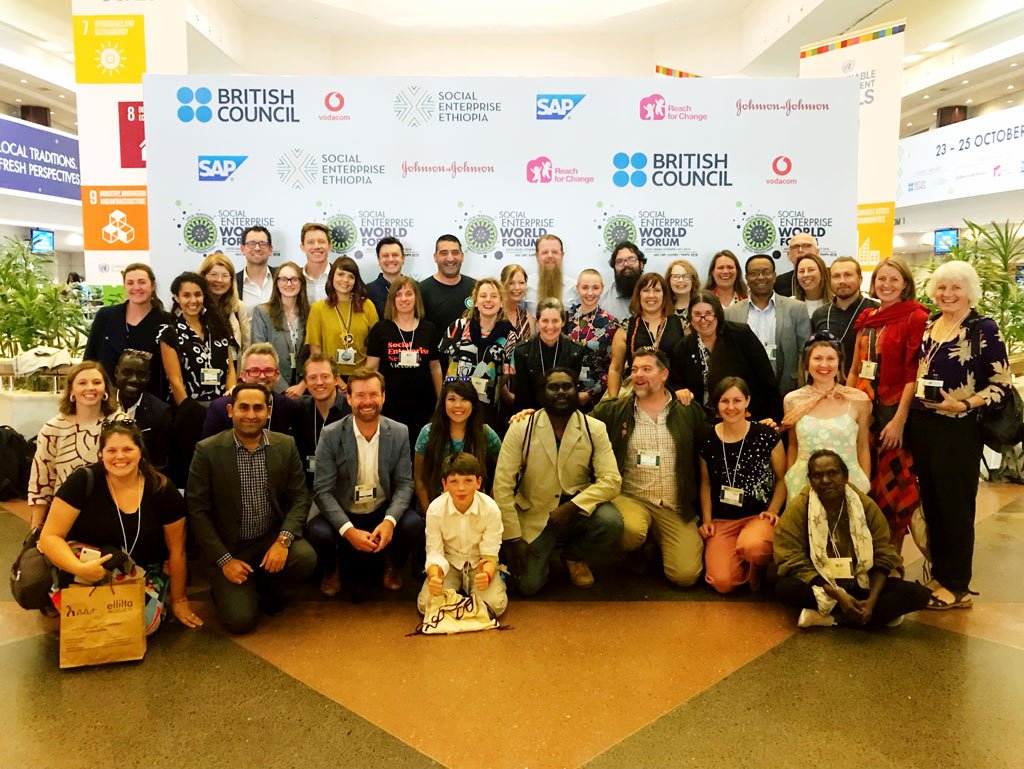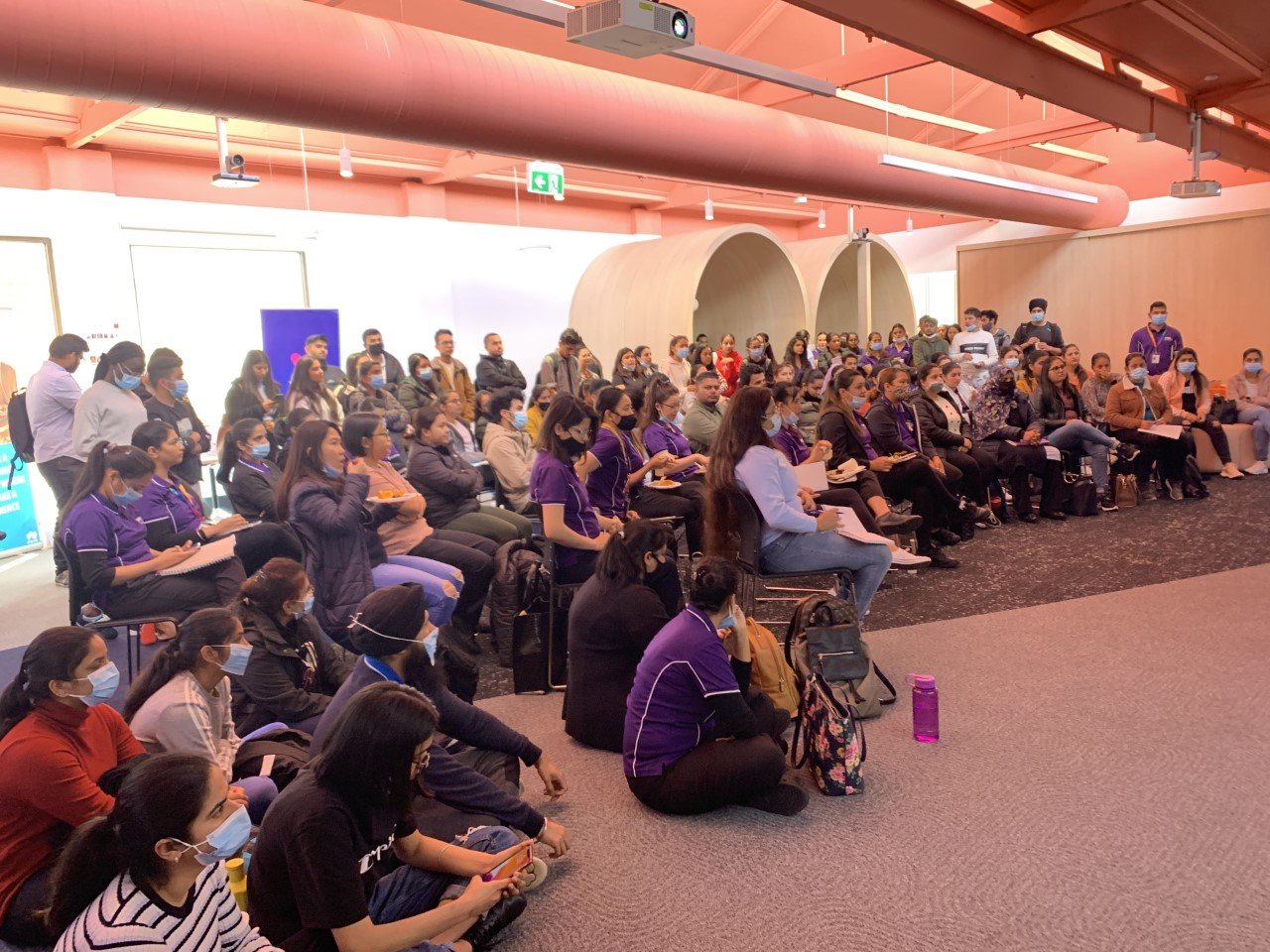Linda Brown and Bryce Ives On How Universities Can Support Changemakers To Create An Impact
(L-R) - Tom Allen with Linda Brown and Bryce Ives.
Linda Brown is the CEO and President of Torrens University and the EY Entrepreneur of the Year.
Linda is also connected to the social enterprise community via her family-owned social enterprise Fruit2Work.
Bryce Ives is the VP of Public Affairs and Communications at Torrens University.
Linda and Bryce are both long term supporters of the social enterprise movement globally, and Torrens University was one of the major partners of the 2022 Social Enterprise World Forum held in Meanjin, Brisbane.
Bryce and Linda discuss transforming tertiary education institutions into hubs for changemakers live from the 2022 Social Enterprise World Forum.
Highlights from the interview (listen to the podcast for full details)
[Tom Allen] - What led to your passion and drive to not just create social enterprises personally, but make Torrens University a certified B-Corp and support the social enterprise movement?
[Linda Brown] - It was really easy. If you look at when we opened our doors in 2013, we had and still have a really good education system in Australia. At the time we had 40 universities doing a great job, but there was a massive gap in the market regarding employability. When I started working with universities, employability was not a ‘sexy’ word. Universities were about higher knowledge and bigger things than employability, so we could really see there was a gap between industry and education. We came in, invested in Australia and got a license to create the first new university. We were looking for differentiators and going to work was not an option for us. We wanted all our students to go to work, but all our students also wanted to change the world, so that led to us adopting social enterprise. Every one of our 21,000 students (in seven years) has done a social enterprise project.
The Australian delegation at the 2019 SEWF in Ethiopia.
Tell us a little bit more about Torrens University and how it is different from other universities?
[Bryce Ives] - We are one of the only private universities in Australia. We're the only investor-funded university, but we're also a B-Corporation. We believe profit and purpose can go hand in hand. When we were founded, we were a part of the biggest public benefit corporation in the world. Really, it's down to every part of our work as a business.
We run a really effective business and put profit and purpose as equal in that business. You can see this in our courses (the way we design them), the experience on campus and the way that we open up our doors and make our campuses activated communities and places. Our vision is grand; it's to connect the world for good.
On any given day, Linda and I (to tell you the truth) probably feel we get close to achieving this, but on other days don't. This is because we're trying to do something fundamentally different. Education needs to be disrupted; higher education is no longer fit for purpose. The old model is not working, and so Torrens is one of the agitators and innovators. At the same time, we have to respond to what our students are saying. To Linda's point, they actually do want to be changemakers. They are interested in a different world and different future.
At the Youth Forum, we had a whole group of (not just social enterprise students); we had people coming from our nursing, branded fashion, hospitality and hotel management school. We see the notions and ethos of social enterprise; the notion of we need to make this world better in all these spaces. Fundamentally, we believe in profit and purpose, and that's applicable to every part of the university. Our attempt is to do it in a holistic way and also to live those values, but I guess the most exciting thing for us is we see thousands of students walk across our stage each year, to collect their testimony as well as the impact of their work. That's where the real change happens. We have 118 nationalities at Torrens today; we're not dominated by one nationality; it is a real tapestry and mixture. When they succeed, anything is possible. That's where we start to see real change. For Linda and I, we're both motivated by a similar thing, which is the belief the classroom should be different, it shouldn't be what it once was; a disconnected expert standing at the front talking down to students. It needs to be experiential; it needs to be in partnership.
With social enterprise, it's not about us being smarter, it's about genuine partnership. Where can we add value? Where can curriculum meet the aspirations of the social enterprise sector and actually do something meaningful?
That's what we set out to do on any given day. When you look at us now, we have grown from 160 students in 2014 to 21,000 today, it's incredible what's actually happened over time.
[Linda Brown] - The other thing which is even more fundamental is that education is a human right. If you look at a social enterprise, we are the epitome of a social enterprise. Our job is not to create smart kids and then push them out, our job is to drive the price down so that everybody who can be educated, is. That goal is global for us; not just for Australia.
As we really care about employability, one of the statistics I found at this amazing conference was there are more people in Australia employed by not-for-profits and social enterprises than in the mining industry.
People want to be where the jobs are, that's why we're here at the conference.
Torrens University Social Enterprise Hub.
What advice would you give to other organisations, whether they be tertiary institutions or social enterprises themselves? How can they best embed impact into their organisation?
[Linda Brown] - I was really blessed this year to be EY Australian Entrepreneur of the Year, which when you think about it, was the first time a university had ever won something like that. I was blessed to travel with 40 people all around the world to look at the global award. For me, it really is about business practices. It is about making sure you're balancing profit and purpose. Bring it down to the fundamentals of knowing what your values and non-negotiables are when collaborating.
know what you're not good at and find somebody who's better at that than you. For me, the business principles you would use in any corporate business should be no different in social enterprise.
One thing I find really challenging with social enterprises is founders are usually the one point of success or failure, and there is a real problem with people who work in social enterprises putting their own oxygen mask on first when the plane is going down! For me, it should be look after yourself, learn about yourself, know your non-negotiables, values, tribe, and then collaborate. For me, this is all very simple advice, but entrepreneurs are trying to solve a problem.
What social enterprises do you believe are creating great positive social impact?
[Bryce Ives] - I'm a huge fan of Green Collect, because they are just up the road from where I live, and my children and I go in every day and find something amazing every day. Straight away, I look at those business models and think, "isn't that extraordinary?" I look towards Taboo Period Products for instance, as this is an example of really interesting and scalable business happening. You have two young women in South Australia who have identified something that 50% of the population is dealing with all of the time, but also, that menstrual poverty is an issue. I've worked in rural and remote Australia where women can't afford the basics and this issue is present.
[Linda Brown] - If I can build on that Bryce, the first Social Enterprise World Forum I met Tom Allen at was in Scotland, Edinburgh in 2018. I was in Scotland four weeks ago, and from those conversations at the Social Enterprise World Forum, sanitary products became free everywhere in Scotland. It shows what can happen from those conversations.
Torrens University Social Enterprise Hub.
What books or resources would you recommend to our listeners to help them on their journey?
[Bryce Ives] - The most exceptional book I've read recently is called The Art of Gathering by Priya Parker. It speaks to Linda's point before around collaboration and not thinking you're the smartest person in the room, but working out your strengths, who else is available and how do you actually connect with them? Priya has written the most eloquent and simple book around how to gather people and why gatherings matter. Let's stop having pointless meetings, let's actually gather with purpose. Let's stop having conferences that are talking heads. Let's actually find ways to properly connect. This book will change your whole notion of what connection and gathering is, and it's full of wisdom.
I think if I jump further, one of the things I've really gotten into during the pandemic (and Linda doesn't know this) is a Chicago radio broadcaster by the name of Studs Tokau. He was the most famous talk interviewer in Chicago for about 50 years, and his whole archive is on a website for a Chicago museum. He has documented the history of social change, social justice and diversity over 50 years, from about 1950 to 1990 when he stopped broadcasting. Why does this matter? Because none of these conversations are new; because we need to know our history, and we don't right now. Why does it also matter? Because we stand on the shoulders of giants. When you listen to these interviews, you get a real sense of where the queer community came from and whose shoulders we stand on. It also asks where does the Black American community come from? What about poverty? How about poverty in Scotland and Europe, how did that develop? This is a time capsule; I swear every time I go and listen to an interview, it just moves and gives me a whole sense of history without needing to read a history book.
If I put in some plugs also, Torrens has a lot of free short courses, but the one that stands out for me is our Introduction to B-Corps. 5,000 people have completed that course now, and it should be mandatory for anyone working at a big corporation.
[Linda Brown] - That's a good course, but we have 120,000 people total taking our short courses for free. We are not the only ones offering those courses; there are masses out there from our supporters and networks that really create an amazing opportunity to connect.
The one thing about this Social Enterprise World Forum is everybody wants to connect together. There's not this protectionism and sentiment of, "that's my space, I don't want to tell you about it." All I can say is link up with everybody, because conversations that started seven years ago for me are still continuing and deepening globally.
Torrens is a good place to start, we have a lot of resources including a social enterprise hub you can receive support from. Students there will do pro bono work for you, and it's a really valuable resource.









